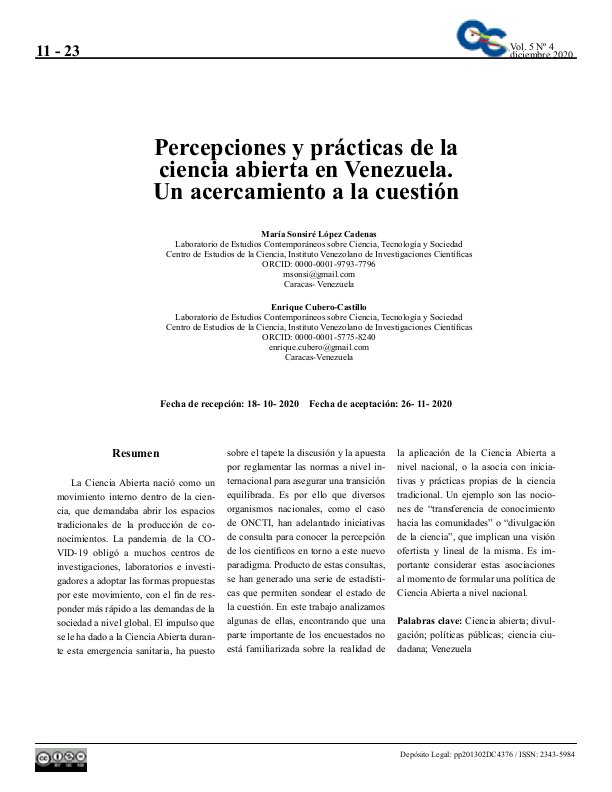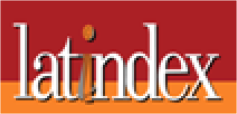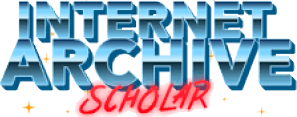Perceptions and practices of open science in Venezuela. An approach to the question
Keywords:
Open science; dissemination; public politics; citizen science; VenezuelaAbstract
Open science emerged as an internal movement within science, which demanded opening of traditional spaces for the production of knowledge. The COVID 19 pandemic forced many research centers, laboratories and researchers to adopt the forms proposed by this movement, in order to respond more quickly to the demands of society at a global level. The boost that has been given to it during this health emergency has put on the table the discussion and the commitment to regulate the rules at the international level to ensure a balanced transition. That is why various national organizations, such as the case of ONCTI, have carried out consultation initiatives to find out the perception of scientists around this new paradigm. As a result of these consultations, a series of statistics have been generated that allow us to probe the state of the question. We analyze some of them in this work, finding that a significant part of the respondents are not familiar with the reality of the application of open science at the national level, or associate open science with initiatives and practices typical of traditional science. An example is the notions of "knowledge transfer to communities" or "science dissemination" that imply a linear and supply-side view of science. These notions are important to consider when formulating a national open science policy.
Downloads
References
Foster, (2015). Open Science Taxonomy. Recuperado en https://www.FOSTERopenscience.eu/FOSTER-taxonomy/open-science Consultado el: 30/09/2020.
Joly, P.-B., & Kaufmann, A. (2008). Lost in Translation? The Need for ‘Upstream Engagement’ with Nanotechnology . Science as Culture, 225-247. Recuperado en: DOI: 10.1080 / 09505430802280727
Sánchez, Ana María. (2002). La divulgación de la ciencia como literatura. Dirección General de Divulgación de la Ciencia. UNAM. México D.F. ISBN/ISSN: 9786070266829
UNESCO (2019). Estudio preliminar sobre los aspectos técnicos, financieros y jurídicos relativos a la conveniencia de contar con una recomendación de la UNESCO sobre la ciencia abierta. París, 8 de marzo de 2019. Recuperado en: https://unesdoc.unesco.org/ark:/48223/pf0000367018_spa Consultado el: 06/12/2020
UNESCO (s/f). Hacia una recomendación de la UNESCO sobre la ciencia abierta. Crear un consenso mundial sobre la ciencia abierta. Recuperado en: https://en.unesco.org/sites/default/files/open_science_brochure_sp.pdf Consultado el: 29/11/2020.
UNESCO (2020). Anteproyecto de Recomendación de la UNESCO sobre la Ciencia Abierta. Recuperado en: https://unesdoc.unesco.org/ark:/48223/pf0000374837_spa?posInSet=1&queryId=6c947dbc-efe4-4024-943c 67e92eca021f&fbclid=IwAR2n8ZFrOPT0ftMFps7HT_JllWxQmUABIsm9FgNWhGrHdsPTayFhpsTKAb4 Consultado el 17/11/2020.
Uribe Tirado, Alejandro; Ochoa, Jaider (2018). "Perspectivas de la ciencia abierta: un estado de la cuestión para una política nacional en Colombia". BiD: textos universitaris de biblioteconomia i documentació, núm. 40 (junio). Recuperado en http://bid.ub.edu/es/40/uribe.htm DOI: http://dx.doi.org/10.1344/BiD2018.40.5 Consultado el: 30/09/2020.
Pontika, Nancy; Knoth, Petr; Cancellieri, Matteo y Pearce, Samuel. (2015). Fomento de la ciencia abierta a la investigación mediante una taxonomía y un portal de eLearning. En: iKnow: 15ª Conferencia internacional sobre tecnologías del conocimiento y negocios basados en datos , 21-22 de octubre de 2015, Graz, Austria. Recuperado en: DOI: https://doi.org/10.1145/2809563.2809571

Downloads
Published
How to Cite
Issue
Section
License

This work is licensed under a Creative Commons Attribution-NoDerivatives 4.0 International License.







